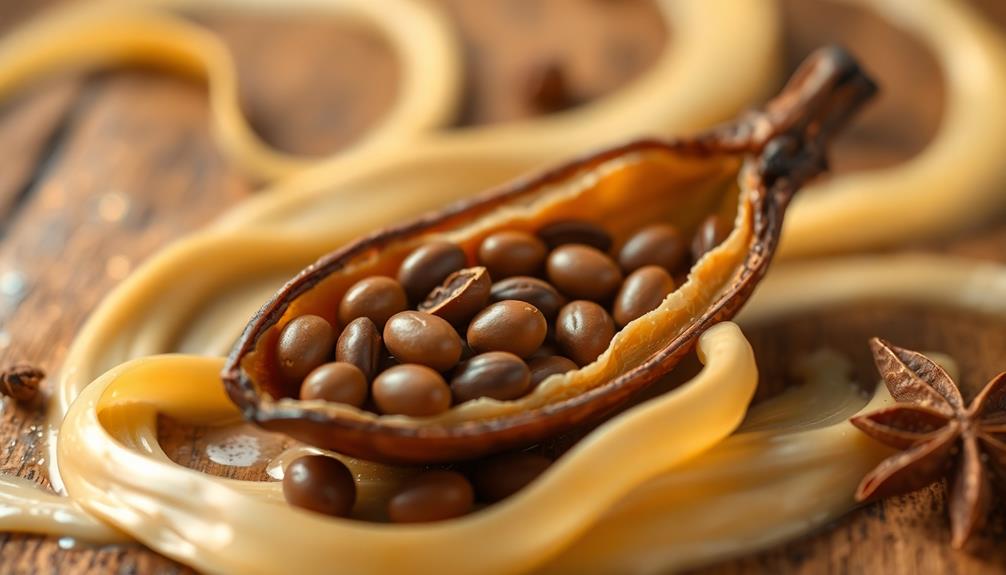When you encounter a stink bug, you'll notice its smell is quite unforgettable! It's often compared to cooking herbs like cilantro, which sounds nice, but it can also be a bit sulfuric or even rancid if you're close to it. This distinct odor comes from special glands in the bug and acts as a defense mechanism. While some folks may find the smell intriguing, many think it's unpleasant. It can linger for hours indoors, making it hard to ignore. If you're curious about how to manage these little invaders, there's more to explore!
Key Takeaways
- Stink bugs release a pungent odor that can resemble cooking herbs like cilantro or coriander when threatened or crushed.
- The smell is often described as sulfur-like, ammonia, or reminiscent of rancid meat.
- The odor lingers for hours or even days, especially in cozy corners of homes.
- Sensitivity to the stink bug smell varies among individuals, leading to different reactions.
- The odor serves as a defense mechanism, deterring predators and signaling danger.
Introduction

Stink bugs, notorious for their pungent odor, can be a real nuisance when they invade your space. You might be surprised to learn that their smell isn't just bad; it serves a purpose! When stink bugs feel threatened or are crushed, they release a strong odor as a defense mechanism.
This smell can be pretty overwhelming, and many people compare it to cooking herbs like cilantro or coriander, though it's definitely not pleasant. The odor has also been described as sulfur-like, similar to ammonia, or even rancid meat! Yikes!
When you encounter stink bugs, you'll notice that the smell can linger for hours indoors, making it hard to get rid of. The intensity of the stink bug smell can vary too, depending on how many bugs are around.
This foul aroma comes from special glands located between their first and second pair of legs, which release a mix of chemicals when triggered.
Description of the Smell

The smell of stink bugs is unmistakable and can be quite overwhelming. When these little critters feel threatened or are crushed, they release a stink bug odor that many describe as a foul aroma. Some people say it smells like cooking herbs, such as cilantro or coriander, while others detect hints of sulfur or ammonia.
It's fascinating how such a tiny creature can create such a strong scent! This odor acts as a defense mechanism, similar to how skunks spray to protect themselves. The stink bug's special glands, located between their first and second pair of legs, produce the smell. As these chemicals evaporate into the air, they can linger for hours, especially if the bugs are indoors.
You might find that sensitivity to the stink bug odor varies. Some folks find it particularly unpleasant, while others aren't as bothered. If you ever encounter a stink bug, remember to handle it with care, as its smell is meant to ward off potential predators and can leave a lasting impression.
Enjoy discovering the world around you, but be mindful of these little smelly creatures!
Source and Composition

When you encounter a stink bug, you might notice the distinct odor it releases from specialized glands located between its first and second pair of legs. This foul odor comes into play when the bug feels threatened or gets crushed. It's like a little alarm bell!
The smell can remind you of cooking herbs like cilantro and coriander, but it can also smell sulfuric, ammoniac, or even like rancid meat.
Isn't that interesting? The composition of this odor includes a mix of volatile chemicals that can linger for hours in your home. That makes getting rid of the smell quite a challenge! Some of these specific chemicals are even used in food additives, which adds a twist to the stink bug's scent profile.
This acrid smell serves as a self-defense mechanism, helping stink bugs deter predators and signal danger.
Typical Scenarios or Environments

In residential spaces, particularly during late fall and winter, you might find stink bugs seeking warmth and shelter. These little pests love to invade homes, and when they do, their odor can become quite noticeable.
The smell is often described as similar to cooking herbs like cilantro or coriander, but it can also turn foul if the bugs feel threatened. If you crush one, the released scent can be sulfurous or even remind you of rancid meat!
Once inside, the stink bug odor can linger for hours, or even days, filling your living space with its strong presence. You might notice it most in cozy corners or near windows where they like to gather. Over time, this persistent smell can mix with other household scents, making it even more challenging to get rid of. In some cases, it may become difficult to distinguish the stink bug odor from other unpleasant smells, such as mold odors in the home, especially if your living space isn’t well-ventilated. It’s important to address both issues promptly to keep your home smelling fresh and clean.
Some people find this smell intensely unpleasant, while others may not be as bothered by it. It's fascinating how we all react differently to this odor!
To keep your home comfortable, it's best to prevent stink bugs from entering in the first place. Seal up cracks and openings, especially as the colder months approach.
This way, you can enjoy your warm home without the pungent smell of these unwelcome guests!
Emotional or Cultural Associations

How does the smell of stink bugs make you feel? For many, it sparks unpleasant emotional reactions. When you catch a whiff, it might remind you of spoiled food, causing a wave of disgust. It's not just about the smell; it's also about what it represents. In agricultural communities, that foul odor can symbolize economic distress. You can practically feel the weight of crop damage in the air, along with the lingering scent of these pests.
Interestingly, some people compare the smell to herbs like cilantro! This surprising connection can bring back memories of delicious dishes and happy times in the kitchen. Isn't it fascinating how a single scent can trigger such different feelings?
Stink bugs also make their mark on social conversations. When you talk to friends or family about encountering stink bugs, their smell becomes a shared experience. You might even find yourself laughing at the exaggerated reactions people have when they catch a whiff!
In this way, stink bugs and their unpleasant odor create a mix of emotional and cultural connections, showing how nature can impact our feelings and memories in unexpected ways.
Health or Safety Considerations

Although stink bugs don't bite or sting, their presence can still raise health and safety concerns for homeowners. These little critters release a strong odor that many describe as similar to cilantro or coriander. For some folks, this smell can be quite unpleasant and may cause discomfort, especially if you're sensitive to strong scents.
When stink bugs feel threatened or are crushed, they release this foul odor, which can linger for hours or even days. This can lead to indoor air quality issues, making your home feel less fresh.
While stink bugs don't pose a direct threat to your health, the odor can create psychological distress and discomfort. If you find yourself dealing with a severe infestation, the overwhelming smell might push you to call for professional pest control services.
It's important to keep in mind that the chemicals responsible for the stink bug odor are similar to those in some food additives, raising questions about potential allergic reactions in sensitive individuals. So, while they mightn't bite, their odor can still shake things up in your home!
Final Thoughts

While stink bugs may not pose a direct health threat, their distinctive odor can certainly disrupt your comfort at home. You might notice that the smell is often compared to cooking herbs like cilantro or coriander, but it can also be quite sulfurous or reminiscent of rancid meat.
This foul smell comes from specialized glands that the bugs use to warn off predators. The odor can linger for hours, especially indoors, making it a challenge to eliminate.
Sensitivity to the stink bug odor varies from person to person. Some folks find it more offensive than others, which can make your home feel less inviting.
Luckily, there are ways to prevent stink bugs from invading your space in the first place. Sealing cracks, using screens on windows, and keeping doors closed can make a big difference.
Frequently Asked Questions
How Long Does a Stink Bug Odor Last?
Stink bug odor can linger for hours indoors, often depending on surfaces and the amount released. Outdoors, it dissipates more quickly, but you might still catch a whiff for a shorter duration.
Can Stink Bugs Stink up a Room?
Yes, stink bugs can definitely stink up a room. If you've got a few, their odor might not be overwhelming, but a larger group can fill your space with a pungent, lingering smell.
Is Stink Bug Smell Harmful to Humans?
Stink bug smell isn't harmful to you. While it can be unpleasant and cause discomfort, it doesn't pose serious health risks. It's just nature's way of defending itself, leaving you with an annoying odor.
What Is Mistaken for a Stink Bug?
You might mistake a brown marmorated stink bug for boxelder or kissinger bugs due to their similar shapes. Other insects, like certain beetles, also release odors that could easily confuse you in identifying the source.









